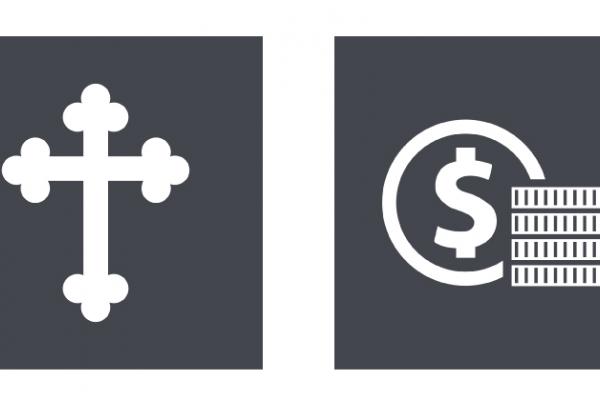Author’s Note: Institutions we have valued for generations are dwindling and falling by the wayside because we no longer have the finances to sustain them. In this second essay on financing seminary education (read the first HERE), I will address the socio-political and economic concerns that add to the complexity of the current crisis in theological education.
Democracy is based on the ideal of political equality. Each citizen is to have the same potential to influence what government does regardless of financial status. Markets, on the other hand, are directly related to real dollars. The consequent result for the U.S. democratic capitalistic structure is that while the rich and the poor are equal politically, they will never be equal economically. This combination could lead to two undesirable extremes: 1) mob rule by asset-less democratic majorities, or 2) oligarchic rule by the affluent. Thus, government’s role is to oversee the enterprise through the creation of regulatory policies that prevent runaway markets and taxation that assures a sustainable distribution of wealth and resources for the whole population. In order to achieve these goals, political theorists have developed models that focus on creating and sustaining a strong middle class with the result that the median voter will correct rising inequality in wealth as well as poor economic performance.
Some key terms, conservative, progressive, and liberal, get used frequently in our world and are often applied to differing fields with varying results. With regard to U.S. economics, if I am fiscally conservative, I am voting on behalf of the wealthy for reduced taxes and fewer free market regulations. If, however, I am fiscally progressive, I am announcing my commitment to markets that will have limits set on their growth potential and an incrementally higher tax rate for the wealthy. If I declare myself a fiscal liberal, then I am committed to the progressive agenda plus the creation of social programs that will care for the immobilized members of society.
Our nation has experienced a continual conservative policy shift for 35 years that has resulted in runaway markets and an ever widening economic gap between the rich and the rest of us. From 1979 until 2006 the top 1 percent received 36 percent of all the income growth generated in the American economy. Meanwhile, the middle-class incomes have remained about the same, but only because the middle class has been working harder; most middle-class households have shifted from single income to dual income.
In response to this continual conservative fiscal shift we saw the first “democratic awakening” on Sept. 17, 2011: Occupy Wall Street in New York City’s Zuccotti Park. By Oct. 9, Occupy protests had taken place in 951 cities across 82 countries, and in more than 600 communities in the U.S.
Hacker and Pierson (Winner-Take-All Politics) have designated the tipping point. In 1979, upon the heels of Jimmy Carter’s attempt to end the tax exemption of hundreds of Christian schools that white southerners had established after desegregation, Paul Weyrich, Richard Vigueirie, and others met with Jerry Falwell, a minister of a large Southern Baptist church in Virginia, to talk about building a “Moral Majority.” Weyrich, a former Republican senatorial aide, and founder of the Heritage Foundation, was the main architect of the Moral Majority. He saw the Moral Majority as a means to appeal to ordinary voters, especially in the South and the Midwest, by pitting conservative Christians against abortionists and other liberals committed to desegregation, the ERA, gay rights, welfare, and other progressive programs.
In an article titled “Building the Moral Majority” Weyrich made his ideological stance known; calling those who support desegregation of schools, SALT, unions, and the social gospel ‘enemies of the family and society.’ Simultaneously, he described his coalition as those who ‘still subscribe to moral principles, and are rooted in the authentic Gospel.’ No clear statement was made about economics.
Due to low funding, the Moral Majority was dissolved at the close of the Reagan administration. In 1986 Pat Robertson, after a failed attempt for the U.S. presidency, created the Christian Coalition. Robertson tapped Ralph Reed, head of the College of Republicans, as director to lead the fight against sex education in the schools, defeat a gay rights proposal, and support the nomination of Clarence Thomas to the Supreme Court. The conservative Christian vote became aligned with the GOP, trading support on social issues for an economic agenda tailored to ever increasing fiscal conservatism.
The Moral Majority and the Christian Coalition were duped into voting for politicians they believed were working in their best interests. In the end, the fiscally conservative political elite has gained control of congress. We have moved into oligarchic rule. On this final point Paul Weyrich and I agree as evidenced in his recent book entitled The Next Conservatism.
So 'What Next?' Stay tuned for part III of this article series.
LeAnn Snow Flesher, PhD, is Academic Dean/CAO and Professor of Old Testament at American Baptist Seminary of the West at The Graduate Theological Union in Berkeley, Calif.
Image: A Aleksii / Shutterstock.com
Got something to say about what you're reading? We value your feedback!
